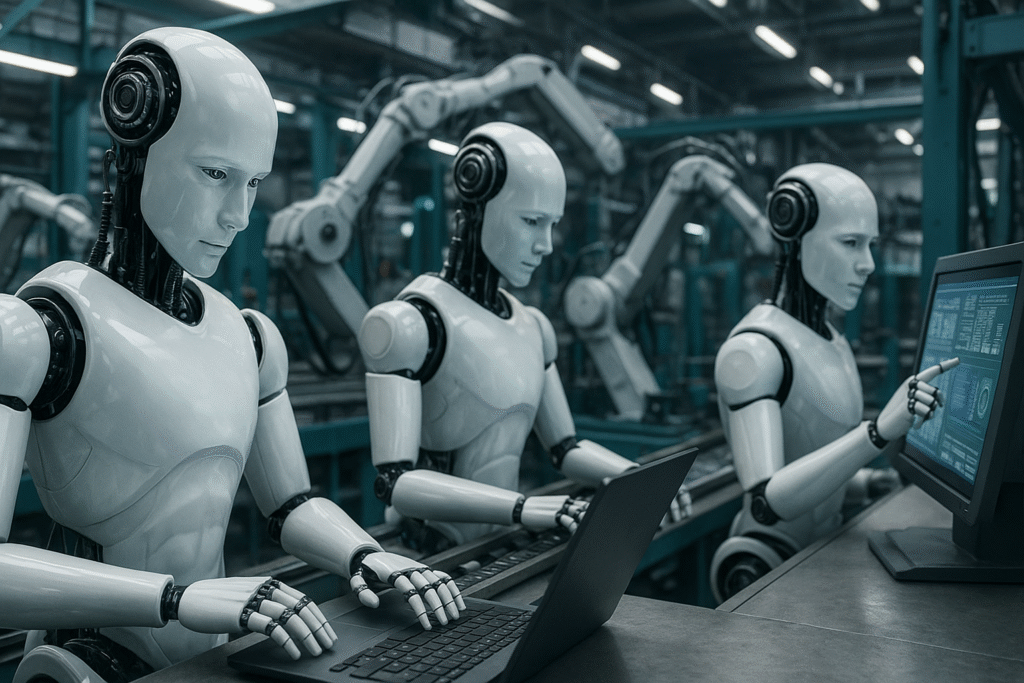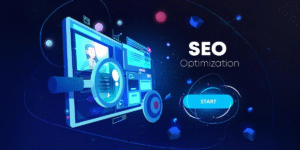Introduction
Right now we live in a time where being innovative is no longer “the most” accenting but rather an aspect you should shoot for at work or perhaps splotch on like a wedge of frippery. One of the major reasons for this is the disruptor we refer to as Artificial Intelligence (AI). Automation has made AI and sci-fi concept to something that business can actually do now. No matter how big your startup is or the size of the multi-national enterprise, AI automation is supporting businesses in automating unnecessary grunt work and streamlining operations while creating lifelong experiences for customers.
Think a world where those boring jobs are completed quickly, you no longer have to think about doing mundane and repetitive work – but instead concentrate on growing relationships with clients. And that’s what AI automation delivers. But, you may ask: What role does AI automation play in the business development? Why should it be considered something to grow with in future?
In this article, we’re going to dive deep into AI automation: what it is, what’s in it (advantages and disadvantages), how to use AI automation and where we can find future potential. At the end, you’ll understand why it’s no longer a matter of if you should adopt AI, but an imperative for continued success and business survival.
What is AI Automation?
AI automation is the use of intelligent systems driven by AI to automate tasks which were previously performed by humans. While conventional machines simply do what they are asked to do, AI tools take action according to the knowledge that they have gained. It provides speed and accuracy in a lot of their business process as well.
Core Elements of AI Automation
You’ve to understand it more concerning what AI mean for business?Here I’m sharing the building blocks for automation at scale:
- Machine Learning (ML): These are algorithms that understand or learn from data in the sense that they get better over time as the model trains and sees more patterns in the data. So, to anticipate sales trends, for example, ML might learn that customers generally make purchases over the weekend.
- Natural Language Processing (NLP) The field that provides computers with the ability to understand and generate messages in a human language. Chatbots and voice assistants (Siri, Alexa, Google home) use NLP.
- Robotic Process Automation (RPA): A kind of software technology that automates rule-based, repetitive processes like processing invoices, handling payroll and entering data.
- Predictive Analytics – Applications that analyze data to predict future outcomes, allowing businesses to anticipate customer needs and market dynamics.
“By using all of these in concert,” companies can create “smart systems that learn, adapt and provide value in every area of the organization,” she says.
AI For Corporate Development: The Value Of Standalone AI
Business development is about stretching yourself, whether that means growing your market base, developing relationships with potential clients or tightening processes. Underpinning all of these efforts is AI automation meaning that the technology isn’t a supporting device so much as it is a growth partner.
- Operational Efficiency – Automation helps unclog bottlenecks and pull employees out of the mud of rote work so they can focus on strategy and innovation.
- Analysis: The load of data that businesses have to deal with today is staggering. This data is fed into algorithms at lightning pace, learning superhuman insights that a human might miss.
- Personalised Customer Relation: Intensify relationship through interaction. AI software systems can understand their customers and tailor product recommendations or services.
In its research, McKinsey has determined that close to 70% of a company’s (or organization’s) processes can be automated using AI as having high volumes of repetitive and routine work. But this isn’t just a time saver; it allows companies to focus human creativity on more difficult challenges.
Key Benefits of AI Automation
Cost Reduction
Due to use of AI, the companies can reduce its unnecessary and irrelevant costs as there is less dependency on manual labor and less chance of error due to human intervention. Automated invoicing, for example, makes it feasible to avoid unnecessary and very expensive errors; Artificial Intelligence (AI)-driven customer support means you need fewer armies of bods to do customer service at massive scale.
Time Efficiency
Unlike them, our human trainers, they work 24/7 and don’t take vacations. So you get things done more quickly, response times are shorter and projects move faster.
Scalability
As businesses expand, workloads increase. Escale AI tools handle all growing tasks, so there isn’t any hiring and training required for seamless long term scalability.
Improved Customer Service
With Bots, an AI-based CRM and auto reply systems you can automatically reply, answer general queries and suggest probable solutions. It all adds to the overall reader experience.
Accuracy and Reliability
With AI, we can avoid human error, so the output is more precise — whether it’s analyzing data; making financial decisions; interacting with customers.
AI in Sales and Marketing
Business development is sales and marketing. AI provides truly enormous advances in each of these areas too:
- Lead Generation: AI can collect data about a user’s browsing history, past purchases and online activity to predict which leads are most likely to close.
- Customer Segmentation: With the help of AI, companies can segment their customers based on how they buy, what preferences they have and demographics in order to create more targeted campaigns.
- Personalized offerings: AI knows who customers are most likely to buy, and serves up targeted offers and suggestions that boost engagement and sales”
On the sales side, AI can automate lead scoring, follow-up emails and CRM updates. That’s more time closing deals and less time doing admin. In marketing, this data is delivered in the form of campaign analytics that are updated in real time so that companies can shift strategy just as fast.
CRM AI_DEFINITION What is AI in CRM?
A growing base of customers and trust is loyalty. AI-powered CRMs enhance this by:
- Automated Answers: With AI chat bots you can respond immediately to your customers – leading to higher levels of customer satisfaction.
- Predictive Requirements: AI uses past behavior to predict what a customer will need and make an offer in advance.
- Increased Engagement: CRMs track likes and dislikes, along with interactions which help businesses deliver more personalized communication.
Good AI CRM can enable customers to feel heard, valued and understood but all three go towards building stronger relationships.
AI in Data Analytics
‘Data is the new gold, but raw data does not make us smarter. AI is the magic that deciphers intricate data sets, offering intelligent business solutions.
- Information on Demand: Firms will be able keep their finger on sales, customer activity and market trends in an instant.
- Trend Prediction : AI has capabilities to predict trends, and companies can prepare for them before they happen.
- Data-Driven Decisions: Decision makers can now be free from all the guesswork they have previously had to be mind numbed with and now make calls under informed circumstances.
AI in Human Resources
You have to deal with people as well you do customers. There are multiple ways HR departments are being transformed by AI:
- Job Recruitment Automation: Through AI a resume can be scanned, the best candidates sorted and even an initial interview may conducted.
- Employee engagement: Tools for tracking morale and giving guidance to create a better working environment.
Performance Evaluation: AI assesses the performance of the employees more objectively/user-data based and not emotion-based.
AI in shipping and logistics
Efficiency of the supply chain defines how easily products are delivered to customers. With the rise of intelligence in logistics – Thanks to AI:
- Demand Forecasting- Estimate of required products to prevent under or over stocking.
- Stock Control: Simplified stock management to prevent errors and wastage from occurring.
- With a tool that calculates the best and cheapest delivery routes.
Business Artificial Intelligence Automation Tools
Popular AI automation tools There is no dearth of popular AI automation tools such as:
- Chatbots for customer interaction.
- RPA for administrative work.
- AI CRMs like Salesforce or HubSpot for customer relationships.
- AI-driven marketing AI marketing tools like HubSpot, Marketo & Mailchimp for recurring campaigns.
Challenges in Implementing AI
Yet businesses are running into obstacles to gaining those rewards:
- Pricey: The initial cost of adopting AI can be too much for a small business.
- Skills Gap: Workforce needs the right education to work with AI.
- Data Privacy: AI focuses on data so security is one of governance that has to match the volume, diversity and pace of data.
AI for the SME (small and medium enterprise)
AI isn’t just for big companies. And Now, Small and Medium Enterprises Can Afford It:
- Automating customer service with chatbots.
- Simplifying marketing through AI-powered tools.
- Improving efficiency in managing resources.
- AI also allows SMEs to level the playing field and grow faster.
The Future of AI in BD
AI’s penetration will be strengthened by:
- IoT (Internet of Things) APPLN:The application for IoT Access.
- Blockchain and AI – strengthening data security and transparency.
- Smarter Automation: AI that goes beyond simple automation.
Ai Business Schools of Tomorrow! In the future, businesses can jump ahead in this race if they work Ai into everything that they do.
AI Automation Best Practices
- Assess Requirements: Identify what needs to be automated.
- Use The Appropriate Tools: Select tools based on the suitability for your business.
- Train Employees: Assist the workers so they know how to use AI tools.
- Follow up Performance: Continue to monitor and calibrate the AI systems for optimizing it’s outputs.
Case Studies of AI Success
- E-commerce: AI helps Amazon with product recommendations and warehouse management, which in turn drives sales and increases efficiency.
- Healthcare: When you visit hospitals, AI works behind the screen to scan patient data and make correct diagnosis.
- Finance: A.I. is used by banks to detect fraud and personalize financial services.
These examples show that AI can be more than just theoretical: It’s already in the process of revolutionizing industries.
Conclusion
AI Automation is no longer a distant concept it is the reality of business growth today. Centregain with AIWe’ve seen how everyone from retail to manufacturing, healthcare or finance and all gold in between, everyone has been throwing “AI” around like it’s the new black.
Business owner, or operator of a company of any size from the dinky corner store to the multinational? Using AI is about getting ready for what’s coming next; it’d be remiss not to. Whomever adopts AI automation today will take the lead in their respective industry, and whomever doesn’t will be trying to play catch up. The writing is on the wall; for businesses to compete, they need to evolve and AI is the channel that unlocks it.








